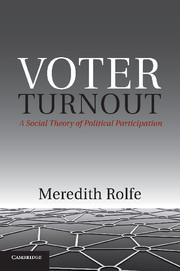Description
Voter Turnout
A Social Theory of Political Participation
Political Economy of Institutions and Decisions Series
Author: Rolfe Meredith
This book combines positive political theory, social network research and computational modeling, explaining why some people are more likely to vote than others.
Language: English
Subject for Voter Turnout:
Approximative price 28.98 €
In Print (Delivery period: 14 days).
Add to cart
Voter Turnout
Publication date: 08-2013
Support: Print on demand
Publication date: 08-2013
Support: Print on demand
Approximative price 89.58 €
In Print (Delivery period: 14 days).
Add to cart
Voter turnout: a social theory of political participation
Publication date: 02-2012
248 p. · 15.2x22.9 cm · Hardback
Publication date: 02-2012
248 p. · 15.2x22.9 cm · Hardback
Description
/li>Contents
/li>Biography
/li>
This book develops and empirically tests a social theory of political participation. It overturns prior understandings of why some people (such as college-degree holders, churchgoers and citizens in national rather than local elections) vote more often than others. The book shows that the standard demographic variables are not proxies for variation in the individual costs and benefits of participation, but for systematic variation in the patterns of social ties between potential voters. Potential voters who move in larger social circles, particularly those including politicians and other mobilizing actors, have more access to the flurry of electoral activity prodding citizens to vote and increasing political discussion. Treating voting as a socially defined practice instead of as an individual choice over personal payoffs, a social theory of participation is derived from a mathematical model with behavioral foundations that is empirically calibrated and tested using multiple methods and data sources.
1. Introduction; 2. Conditional choice; 3. The social meaning of voting; 4. Conditional cooperation; 5. Conditional voters; 6. The social theory of turnout; 7. Education and high salience elections; 8. Mobilization and turnout in low salience elections; 9. Paradox lost.
Meredith Rolfe held a Postdoctoral Prize Research Fellowship at Nuffield College prior to becoming a Senior Research Fellow at Saïd Business School, University of Oxford. Her dissertation was awarded the Mancur Olsen Dissertation Grant by the APSA Political Economy section. Rolfe has been awarded grants by the National Science Foundation, the British Academy, Oxford's John Fell Fund, the EU-sponsored Equalsoc Framework and the Oxford University Centre of Corporation Reputation. Her work has appeared in Public Opinion Quarterly and L'Année Sociologique, and she was an invited contributor to the Oxford Handbook of Analytical Sociology and the Oxford Handbook of Corporate Reputation.
© 2024 LAVOISIER S.A.S.




